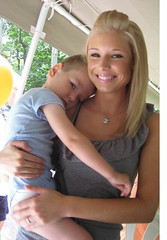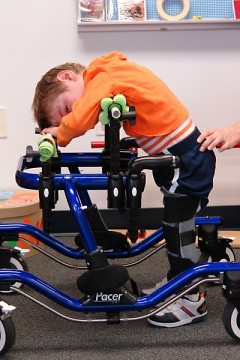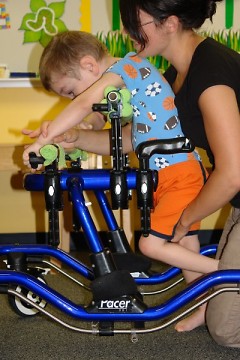This is Keagan. He is four years old, loves sports and Spider-man and was born three months early against all odds.  When he was about six months old, he started to show signs of physical disability: not holding his head up, not wanting to grasp or play with toys, not rolling over or trying to crawl. As he got older, it was clear that therapy would be the solution for him to grow and develop at his own pace.
When he was about six months old, he started to show signs of physical disability: not holding his head up, not wanting to grasp or play with toys, not rolling over or trying to crawl. As he got older, it was clear that therapy would be the solution for him to grow and develop at his own pace.
Keagan was turned down for grants to cover therapy costs, but the therapy he was receiving at the Conductive Learning Center in Grand Rapids was exactly what he needed.
“[Therapy] was the answer to our prayers,” says Natalie, Keagan’s mother. “However, the answer to our prayers was also more expensive than anything we have ever done before. We knew Keagan needed to be in the program, but it’s been hard for the last couple of months trying to find the money to afford it.”
Keagan’s family soon applied for a Therapy Scholarship from Family Hope Foundation, a nonprofit organization based in Grand Rapids. Because the foundation does not define “special needs,” children with many different disabilities receive financial support, including children with autism spectrum and Asperger’s, sensory processing, speech and language, cerebral palsy, and those living with physical disabilities like Keagan.
“This is why Family Hope Foundation means so much to me,” says Natalie. “They embrace all special needs, so it means that Keagan will have the opportunity to go to Conductive Education and get the best therapy possible for him.”
Since its forming in 2010, Family Hope Foundation has provided more than $25,000 to families of children with special needs in West Michigan. Through many generous local donors, these families are able to relax knowing that their children’s needs will be met without putting them through financial stress.
The foundation promotes “advocacy through collaboration” and exists to provide financial support to families whose insurance either covers only portions of therapy costs or none at all, which for many families means that receiving financial assistance is the only way these life-changing therapies will continue.
About half of grant applicants were awarded assistance in 2010. This budding local nonprofit has been flooded with appreciation and requests for assistance since its first year, and they hope to grow and expand their reaches to more families across West Michigan.
The Rapidian, a program of the 501(c)3 nonprofit Community Media Center, relies on the community’s support to help cover the cost of training reporters and publishing content.
We need your help.
If each of our readers and content creators who values this community platform help support its creation and maintenance, The Rapidian can continue to educate and facilitate a conversation around issues for years to come.
Please support The Rapidian and make a contribution today.



 When he was about six months old, he started to show
When he was about six months old, he started to show